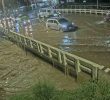By Mark Anthony Duran, Davao Today Intern
DAVAO CITY – Eight years after an ordinance here banned aerial spraying of fungicides on banana plantations, advocates say the fight must continue to prevent unmonitored practices to contaminate the watersheds.
Environmental group Mamamayang Ayaw sa Aerial Spraying (MAAS) disclosed that the plantation and farm owners in the barangays of Dacudao and Subasta in Calinan District continued to use aerial spraying.
“Both barangays are also located in important but critically endangered watersheds. Subasta, in particular, is located in the Talomo-Lipadas Watershed where the city sources its drinking water,” said Dagohoy Magaway, president of MAAS.
MAAS said that the environment group Interface Development Interventions, Inc (IDIS) “found [in 2013] traces of pesticides in air and water samples taken from four separate areas in the Talomo-Lipadas and Panigan-Tamugan watersheds.”
Magaway said that these watersheds are “the current and future sources of drinking water for the city.”
In a privilege speech Tuesday at the City Council here, Councilor Leonardo Avila III said that they would press hard on plantations still using aerial spraying.
Avila said that they have held several hearings “between the workers and residents against the multinational companies in September 2006 to February 2007.”
“We concluded that the people like farmers and farm workers and the environment, were not as resilient as the large-scale agricultural plantations,” Avila said.
“This decision also favored the next generations of Davaoenos living within the periphery of the agricultural plantations and the bodies of water where we source part of our drinking, domestic and agricultural requirements,” he said.
Ordinance 0309-07 entitled “An Ordinance Banning Aerial Spraying Practice in all Agricultural Entities in Davao City” was passed by Davao City in March 2007 but was questioned in court by giant banana plantation group Pilipino Banana Growers and Exporters Associaion (PBGEA).
The ordinance prohibits aerial spraying of fungicides in 1,800 hectares out of the total 5,000 hectares of banana plantations in Davao City.
Six months later, in September 2007, PBGEA filed a case questioning the constitutionality of the ordinance before the Regional Trial Court 17.
The RTC Branch 17 affirmed the constitutionality of the ordinance but PBGEA elevated the case to the Court of Appeals in Cagayan de Oro City.
The appellate court declared the ordinance unconstitutional on January 2009. A month after, in February 2009, MAAS and other groups elevated the case to the Supreme Court where it is now pending.
MAAS said it also demands for immediate implementation of Davao’s Watershed Code “which contains provisions that prohibit aerial spraying in the designated environmentally critical areas (ECA) of the watersheds.”
“We will work with what we have. Right now, it is the Watershed Code, which is currently being implemented, that allows us to protect Talomo-Lipadas, Panigan-Tamugan and other watersheds from contamination by toxic chemicals released through aerial spraying. Even as the Ban AS ordinance awaits final resolution, the campaign to eradicate aerial spraying continues.” Magaway said.
Avila also said that during 2004, “there was already a statement from the Department of Health urging the Department of Agriculture to stop aerial spraying until sufficient proof of its safety was clearly established.”
“While our fight has not ended, as the case is still pending at the Supreme Court, there are some things to be thankful for: with agricultural plantations expanding to other areas outside of the city, other LGUs that have existing large-scale plantations still using aerial spray have been inspired by ordinance and are taking their own measures to pursue similar ban,” Avila said.
Avila said that there are bills in Congress seeking to ban aerial spray “both moving towards the total ban of aerial spraying in the country”.
He said they are calling on the national government agencies and the Congress to “fast-track the legislative process on the proposed aerial spray ban.” (davaotoday.com)










